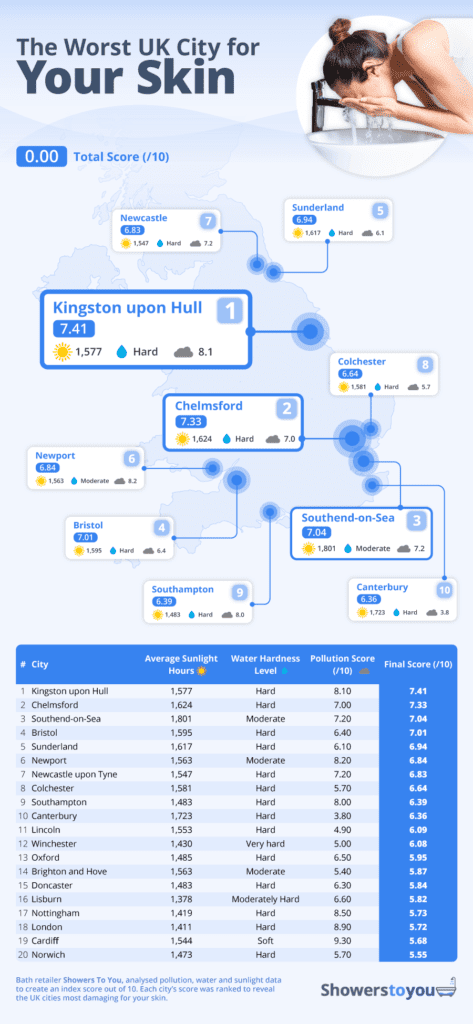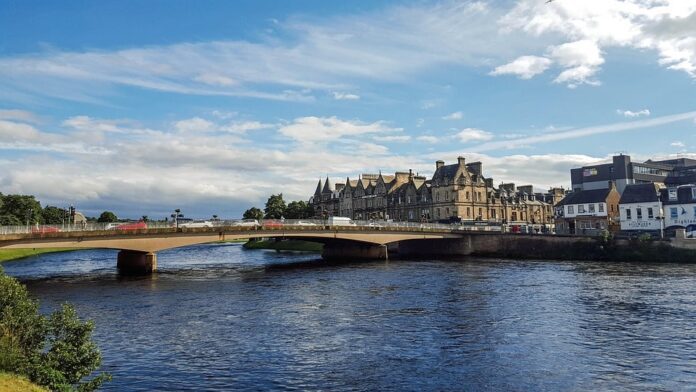The top 10 best cities for your skin
| Rank | City | Average Sunlight Hours | Water Hardness | Pollution Score (/10) | Skin Impact Score (/10) |
| 1. | Inverness | 1,292 | Soft | 0.3 | 0.20 |
| 2. | Stirling | 1,393 | Soft | 0.8 | 1.09 |
| 3. | St Asaph | 1,413 | Soft | 1.0 | 1.33 |
| 4. | Glasgow | 1,361 | Soft | 3.2 | 1.43 |
| 5. | Perth | 1,437 | Soft | 0.2 | 1.51 |
| 6. | Bangor | 1,435 | Soft | 1.0 | 1.64 |
| 7. | Aberdeen | 1,442 | Soft | 1.0 | 1.93 |
| 8. | Dunfermline | 1,434 | Soft | 2.0 | 1.94 |
| 9. | Dundee | 1,488 | Soft | 0.9 | 2.35 |
| 10. | Ripon | 1,494 | Soft | 1.2 | 2.47 |
All data rankings can be found here.
Inverness, Scotland is the best UK city for your skin, receiving an overall skin impact score of just 0.2 out of 10 in Showers To You‘s Skin Impact Index. The highland city receives an average 1,292 hours of UV sunlight each year, over 200 hours more than Londonderry, Ireland (1,072) who are least at risk from UV sun damage. With a water rating of ‘soft’, Inverness is among seven Scottish cities with the softest water in the UK and scores a pollution rating of just 0.3/10 — the second lowest of all cities analysed.
Also located in Scotland, Stirling (1.09/10) claims second place. Residents have a slightly higher risk of UV sun damage than Inverness (1,292) with 101 more hours of sunlight at 1,393 hours annually. Pollution levels come in at 0.8 out of 10 and water is rated ‘soft’ with a hardness level of 1.
One of two Welsh cities in the top 10 best cities for your skin, St Asaph lands in third. The second smallest city in Britain receives an overall skin impact score of 1.33 out of 10, a soft water level rating of 1 and pollution scoring is also relatively low at 1/10.
Hull is the worst UK city for your skin
Kingston upon Hull is the worst UK city for your skin, receiving an overall skin impact score of 7.41 out of 10. The Yorkshire city receives an average 1,577 hours of UV sunlight each year and a pollution rating of 8.1/10. The water in Hull is rated ‘hard’ and receives a hardness level of 7/10.
Dr Paul Banwell, former head of The Melanoma and Skin Cancer Unit (MASCU), in the UK, reveals his expert advice on combatting the effects of skin damage:
Pollution –
Repeat exposure to high levels of pollutants can cause irreparable damage to your skin. Not only will the pollutant sit on your skin, feeling dirty, but the constant exposure allows pollutants to penetrate the skin barrier, weakening it, causing inflammation and introducing toxic chemicals to healthy tissue.
Dr Paul Banwell suggests “the best things to protect our skin from pollution are to include an antioxidant, such as Vitamin C, in your routine, which will also help brighten skin. Anything that contains Vitamin A, C and E, Lycopene, Ubiquinone or Antioxidants. Vitamin C is a key ingredient for brightening the skin.”
Hard water –
Many areas in the UK have hard water. The harder the water the higher the levels of minerals such as calcium and magnesium that are introduced into the water when sourced from rivers and reservoirs with limestone beds.
Banwell states that “the high concentration of minerals can disturb the pH level of your skin and potentially cause breakouts“, the build up of soap residue on the skin causes sensitivity, irritation, clogged pores and stripping the skin of its natural moisture.
“Make sure you replenish the skin with lots of moisture. Try using a Hyaluronic acid, which can help keep skin hydrated. Barrier creams can also keep your skin hydrated and protected too”, explains Dr Banwell.
Ultraviolet (UV) light is a form of radiation produced both by the sun and artificially from tanning beds. Excessive exposure to the skin can cause sunburn which damages skin cells, the effects of this damage can include leathery skin, hyperpigmentation and induces signs of premature ageing.
Banwell continues “The most important reason for protection and prevention of sun damage is to reduce the risk of skin cancer including pre-cancers called actinic keratosis, basal cell cancers and the potentially deadly melanoma.”

Eating healthily, exercising regularly, not smoking and drinking plenty of water also play major roles in skin health.
Sun damage –
Banwell details that “The first signs of ageing that are noticeable on the skin’s surface start around the age of 25. This is accelerated if you’ve been exposed to sunlight, and it begins with fine lines and a loss of moisture and progresses over time. Skin ageing is sped up by exposure to the sun”
“Everyone should incorporate a high factor SPF into their daily skincare routine – which will help prevent our skin from UV Light. An SPF will not only protect against the sun’s UVA rays which can cause premature ageing and skin cancer, but also protect against UVB rays which can cause melasma. Newer sunscreens have infrared (IR) protection too. ” states Dr Banwell.
Help keep news FREE for our readers
Supporting your local community newspaper/online news outlet is crucial now more than ever. If you believe in independent journalism, then consider making a valuable contribution by making a one-time or monthly donation. We operate in rural areas where providing unbiased news can be challenging. Read More About Supporting The West Wales Chronicle
























